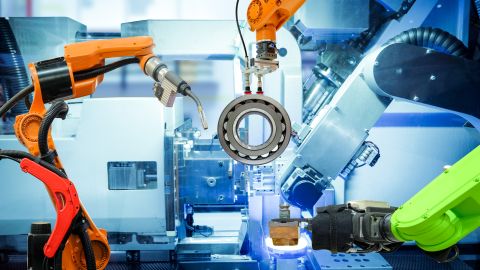We’re in the middle of an industrial revolution where machines are becoming smarter and faster at performing tasks that traditionally required humans. From self-driving cars to facial recognition technologies, artificial intelligence (AI) is transforming how we live.
As part of our visiting entrepreneur program, our next CityTalks Sydney brings together leading thinkers to discuss AI.
We caught up with the event’s international speakers, Robert Hsiung of Udacity China and Nina Xiang from the China Money Network. Robert and Nina are both Chinese entrepreneurs disrupting education and investment reporting with AI. They share their thoughts about why China is leading the way and what Australian businesses can do to take part in the revolution.
Robots, but not like in the movies
According to Nina, defining what we mean by AI is an important starting point. While the term might invoke ideas of a human-like robot of the distant future, technological advancements that enable AI happened long ago.
These include deep learning methods such as image recognition, the ability to handle large data sets and more powerful processors. Today, these allow us to talk to our phones to get directions, or make an order or queue up a song through in-home devices.

As well as creating new products, AI is being incorporated by traditional businesses into their existing processes. Think smart robots organising and stacking goods in warehouses, or retailers using facial recognition to obtain payments.
“AI is not some intelligent being which is a replacement for human intellect. It's not robots gone wild. AI as we know it today is based on analysing historical data, finding patterns and being able to act on those in a much faster way than they once could,” said Robert.
Businesses to adapt or perish
Both Nina and Robert agree that we are now at a point of no return with AI, so businesses must get on board. Nina advises that in order to do this successfully, companies should look at more than a “chatbot in their customer service”. They should take a hard-adaptation path, which entails updating processes.

“We are seeing AI and robotics startups developing new systems that would require restructuring entire warehouse operations. [Warehouses nowadays] already have conveyor belts and robots, such as Amazon's Kiva systems.
“But this new generation of AI-enabled logistics automation systems will be doing a lot more. They will be able to recognise package material, dimensions, shape and even read the label. AI will then be able to learn in real-time how to optimise pallet placement,” said Nina.
Our workforce in flux
Although discussions around AI frequently mention the displacement of low-skilled labour, some might be surprised to hear that traditionally middle-class jobs are set for major change too. The roles of retail staff, journalists, programmers, administrators are evolving.
Robert’s advice is to take part in the revolution. Many large companies are already retraining their workforce to ensure they have digital skills like coding.
He also maintains that although AI is good at analysing data, people are still in charge of entering the information and giving it instruction.
“AI is limited to what they see in the past. It is not good at creative things. But that is the future of work. My advice to young people is to focus on building their ability to problem solve,” said Robert.
China is the new superpower
Nina believes China is the AI giant, but interestingly, this isn’t because it’s the source of groundbreaking innovation. Instead, Nina theorises this success lies in 4 Ss: speed, scale, social indifference and state support.
“Chinese companies move at lightning speeds compared to some of the more life/work-balanced societies. Another factor, inherently, is China's size. China has the biggest car market, biggest solar market. Not surprisingly, China's AI sector is also huge.
“Social indifference means the relative lack of social and civic debate. And government support for AI companies is really enormous,” she said.
So, what does this mean for other markets, such as Australia?
According to Nina, Chinese operators have the first 1km in the AI marathon. This means they can offer other countries advice about what to do.
Our AI future
From an ethical standpoint, Nina would like to see increased public awareness and activism.
“[This will] make sure we don’t end up in situations like in Black Mirror. It is our humanity that will ensure it will be used in a good way,” she said.
Robert’s vision of the future is optimistic. “We should be super excited. AI is going to take a lot of the menial tasks that we do, either at home or in the workplace, away. That frees us up to be more human.”
Hear more from visiting entrepreneurs
Robert and Nina are speaking at our next CityTalks Sydney, Our future with artificial intelligence and its rise in China, on 9 April 2019.
It’s part of our visiting entrepreneur program, where high-profile international entrepreneurs share their knowledge in Sydney.
The ticket allocation is exhausted but you can come and join the wait queue from 6pm, or hear from Robert and Nina speak at other events in the visiting entrepreneur program.
Here are a few events that might interest you.
New trends in blockchain with Lon Wong: Wednesday 10 April, Tank Stream Labs.
Equipping you and your startup to succeed in Australasia: Wednesday 10 April, Sydney School of Entrepreneurship.
Baking ‘global' into your startup from day 1 with Robert Hsiung: Thursday 11 April, Haymarket HQ.
How far ahead is China in AI and why? With Nina Xiang: Thursday 11 April, Sydney Startup Hub.
Published 18 March 2019, updated 29 February 2024



